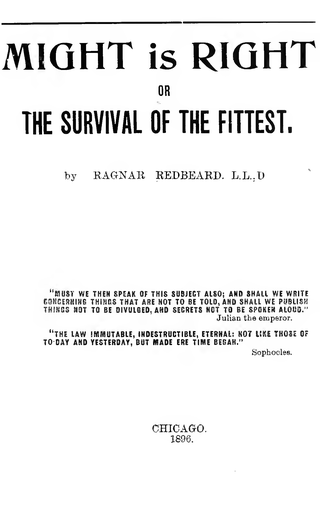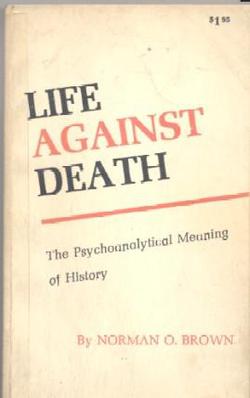
Sigmund Freud was an Austrian neurologist and the founder of psychoanalysis, a clinical method for evaluating and treating pathologies seen as originating from conflicts in the psyche, through dialogue between patient and psychoanalyst, and the distinctive theory of mind and human agency derived from it.

Morality is the differentiation of intentions, decisions and actions between those that are distinguished as proper (right) and those that are improper (wrong). Morality can be a body of standards or principles derived from a code of conduct from a particular philosophy, religion or culture, or it can derive from a standard that a person believes should be universal. Morality may also be specifically synonymous with "goodness", "appropriateness" or "rightness".
Perversion is a form of human behavior which deviates from what is considered to be orthodox or normal. Although the term perversion can refer to a variety of forms of deviation, it is most often used to describe sexual behaviors that are considered particularly abnormal, repulsive or obsessive. Perversion differs from deviant behavior, in that the latter covers areas of behavior for which perversion would be too strong a term. It is often considered derogatory, and, in psychological literature, the term paraphilia has been used as a replacement, though this term is controversial, and deviation is sometimes used in its place.
Amorality is an absence of, indifference towards, disregard for, or incapacity for morality. Some simply refer to it as a case of not being moral or immoral. Amoral should not be confused with immoral, which refers to an agent doing or thinking something they know or believe to be wrong.

Lou Andreas-Salomé was a Russian-born psychoanalyst and a well-traveled author, narrator, and essayist from a French Huguenot-German family. Her diverse intellectual interests led to friendships with a broad array of distinguished thinkers, including Friedrich Nietzsche, Sigmund Freud, Paul Rée, and Rainer Maria Rilke.

In psychology, sublimation is a mature type of defense mechanism, in which socially unacceptable impulses or idealizations are transformed into socially acceptable actions or behavior, possibly resulting in a long-term conversion of the initial impulse.

The History of Sexuality is a four-volume study of sexuality in the Western world by the French historian and philosopher Michel Foucault, in which the author examines the emergence of "sexuality" as a discursive object and separate sphere of life and argues that the notion that every individual has a sexuality is a relatively recent development in Western societies. The first volume, The Will to Knowledge, was first published in 1976; an English translation appeared in 1978. The Use of Pleasure, and The Care of the Self, were published in 1984. The fourth volume, Confessions of the Flesh, was published posthumously in 2018.
Social philosophy examines questions about the foundations of social institutions, behavior, power structures, and interpretations of society in terms of ethical values rather than empirical relations. Social philosophers emphasize understanding the social contexts for political, legal, moral and cultural questions, and the development of novel theoretical frameworks, from social ontology to care ethics to cosmopolitan theories of democracy, natural law, human rights, gender equity and global justice.
Philosophy of sex is an aspect of applied philosophy involved with the study of sex and love. It includes both ethics of phenomena such as prostitution, rape, sexual harassment, sexual identity, the age of consent, homosexuality, and conceptual analysis of more universal questions such as "what is sex?" It also includes matters of sexuality and sexual identity and the ontological status of gender. Leading contemporary philosophers of sex include Alan Soble, Judith Butler, and Raja Halwani.
Might makes right or Might is right is an aphorism on the origin of morality, with both descriptive and prescriptive senses.

Three Essays on the Theory of Sexuality, sometimes titled Three Contributions to the Theory of Sex, is a 1905 work by Sigmund Freud, the founder of psychoanalysis, in which the author advances his theory of sexuality, in particular its relation to childhood.

Might Is RightorThe Survival of the Fittest is a book by pseudonymous author Ragnar Redbeard, generally believed to be a pen name of Arthur Desmond. First published in 1896, it advocates amorality, consequentialism, egoism, and psychological hedonism.

Philippa Ruth Foot was an English philosopher and one of the founders of contemporary virtue ethics. Her work was inspired by Aristotelian ethics. Along with Judith Jarvis Thomson, she is credited with inventing the trolley problem. She was elected a member of the American Philosophical Society. She was a granddaughter of the U.S. President Grover Cleveland.

In social theory and philosophy, antihumanism or anti-humanism is a theory that is critical of traditional humanism, traditional ideas about humanity and the human condition. Central to antihumanism is the view that philosophical anthropology and its concepts of "human nature", "man" or "humanity" should be rejected as historically relative, ideological or metaphysical.

Life Against Death: The Psychoanalytical Meaning of History is a book by the American classicist Norman O. Brown, in which the author offers a radical analysis and critique of the work of Sigmund Freud, tries to provide a theoretical rationale for a nonrepressive civilization, explores parallels between psychoanalysis and Martin Luther's theology, and draws on revolutionary themes in western religious thought, especially the body mysticism of Jakob Böhme and William Blake. It was the result of an interest in psychoanalysis that began when the philosopher Herbert Marcuse suggested to Brown that he should read Freud.
Sexual ethics is a branch of philosophy that considers the ethics or morality of sexual behavior. Sexual ethics seeks to understand, evaluate and critique interpersonal relationships and sexual activities from social, cultural, and philosophical perspectives. Some people consider aspects of human sexuality, such as gender identification and sexual orientation, as well as consent, sexual relations and procreation, as giving rise to issues of sexual ethics.

Kantian ethics refers to a deontological ethical theory developed by German philosopher Immanuel Kant that is based on the notion that "I ought never to act except in such a way that I could also will that my maxim should become a universal law.” It is also associated with the idea that “[i]t is impossible to think of anything at all in the world, or indeed even beyond it, that could be considered good without limitation except a good will." The theory was developed in the context of Enlightenment rationalism. It states that an action can only be moral if it is motivated by a sense of duty, and its maxim may be rationally willed a universal, objective law.
The following outline is provided as an overview of and topical guide to ethics.
In literature, a moral universe is the moral nature of the universe as a whole in relation to human life, or a specific moral code.

Sigmund Freud is considered to be the founder of the psychodynamic approach to psychology, which looks to unconscious drives to explain human behavior. Freud believed that the mind is responsible for both conscious and unconscious decisions that it makes on the basis of psychological drives. The id, ego, and super-ego are three aspects of the mind Freud believed to comprise a person's personality. Freud believed people are "simply actors in the drama of [their] own minds, pushed by desire, pulled by coincidence. Underneath the surface, our personalities represent the power struggle going on deep within us".










